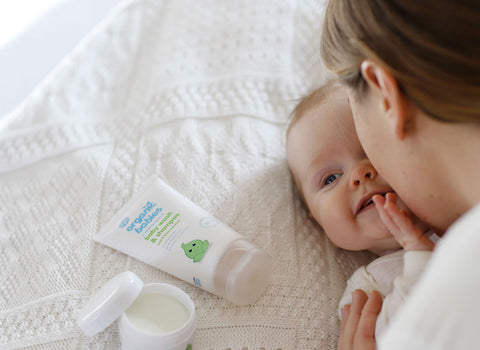Eczema usually develops during infanthood and is sometimes a long-term condition, although in most children it can clear completely over timei.
Eczema can be triggered by many factors, including food and skin care. This can make it challenging to manage, especially at bath times and during the weaning process.
Applying baby eczema creams, balms and salves can help soothe sore skin, but with so much conflicting advice available, how can you tell which eczema management approach is best for your child?
To help you reduce your baby’s risk of experiencing an eczema flare-up, we reveal the everyday eczema triggers your baby can encounter and explain how you can avoid them.
How to avoid infant eczema flare-ups
Eczema is an unpredictable skin condition which can flare up at any time. Healthy skin will act as a barrier to eczema and will shield the skin from bacteria and irritants whilst locking nourishment and hydration into the skin.
If this barrier fails, the skin can become dry, sore and itchy and this can cause considerable discomfort to infants, which can be very distressing for them and their caregivers.
Food, the weather and skin care products are all known to affect eczema, and this makes the condition particularly challenging to manage during the change of seasons and when weaning infants.
With so many factors to consider it can be hard to determine the exact cause of a child’s eczema, but by taking the time to understand the common causes of eczema, you can avoid unnecessary flare-ups.
Common skin irritants for babies prone to eczema
BATHTIME IRRITANTS
Although applying baby eczema creams and emollients can effectively relieve the discomfort of eczema, parents of children with eczema-prone skin should take care to familiarise themselves with the ingredients commonly used in baby bath products which can aggravate delicate skin.
The ingredients used in your baby care products will vary but the main skin irritants to avoid in baby toiletries are harsh foaming agent like SLS and sensitising preservatives like skin-drying alcohol.
Colourants and artificial perfumes are also often added to baby bath products. Whilst they may make bubble baths look and smell appealing, these synthetic ingredients can irritate delicate skin and should be avoided. Instead opt for white or colourless products that you know to be colourant-free.
To avoid artificially perfumed products, check the label and opt for products containing essential oils such as lavender instead of those listing ‘Parfum’ on their ingredients list. Those with babies who have very sensitive skin may wish to avoid even essential oils, and choose scent-free baby products.

Organic Babies Baby-Waschlotion & Shampoo ohne Duftstoffe 150ml
Ekzemfreundliche, duftfreie Wäsche zur Reinigung und komfortempfindlicher Haut
€12,95
Eczema-friendly skin care with Organic Babies
Deciphering skin care labels can be tricky and to make it easier to shop for baby-kind bath-time skin care we make sure all our Organic Babies products are free from SLS, parabens and colourants.

We simply refuse to use unnecessary synthetic additives and preservatives in our products and you won’t find any of the following ingredients in our Organic Babies range:
- SLS
- Lanolin
- Propylene glycol
- Harsh foaming agents
- Synthetic fragrances
- Irritating emulsifiers
- PABA-sunscreen
- Petrochemicals
- Ethyl alcohol
- DEA, TEA, PEGs
- Urea
- Gluten
- Paraffin
THE PARAFFIN PROBLEM
Another ingredient you won’t find in our skin care is the petrochemical Paraffin. Throughout 2018, Paraffin skin care products hit the headlines with reports warning that the ingredient, commonly used in eczema products, can pose a fire riskii.
Whilst an effective way to relieve the discomfort of eczema, concerns have been raised that, because Paraffin skin care can soak into fabrics such as clothing and bedding, the flammable ingredient could ignite if it meets a source of fire.
We have never used Paraffin or any other petrochemicals in our skin care. Instead we use Squalane, an eczema-friendly plant-based emollient known to nurture and support the outer layer of skin.
Derived from Olive, Squalane is an all-natural, anti-inflammatory emollient which has no known flammability risks and sinks deep into the skin to calm irritation and deliver long-lasting hydration.
FOOD ECZEMA TRIGGERS
In addition to being triggered by skin care, eczema is a common food allergy symptom and when navigating the weaning process, you may unearth that your child’s eczema is caused by a food intolerance.
Common food allergens include dairy products, seafood, nuts and gluten and parents of eczema-prone children may find keeping a food diary helps them to identify their child’s food triggers. If you think your child has a food allergy their GP may also advise that they undergo an allergy test or that you eliminate certain foods from their diet to see if their symptoms improve.
To make skin care shopping safer for all, we do not use gluten in any of our products. However, Sweet Almond oil is nut derived and used in our baby balms and salves so, if you know your baby has a nut allergy, these products may not be suitable for you. Whilst all care is taken to make our products safe for the most sensitive of skins, as even natural products can trigger an allergy in ultra-sensitive skin, we always advise conducting a patch test before applying product to the skin.
Paraffin-free baby products
Looking for a Paraffin-free way to manage your child’s eczema-prone skin? All Organic Babies products are SLS and Paraffin-free and gently care for sensitive infant skin.
Do you have a question about managing infant eczema with our Organic Babies range? Drop us a note in the comments section below or alternatively why not give our friendly customer care team a call? We are available from 9AM-5PM Monday to Friday and can be contacted on 01403 740350.
[i] https://www.nhs.uk/conditions/atopic-eczema/
[ii] https://www.gov.uk/government/news/emollient-cream-build-up-in-fabric-can-lead-to-fire-deaths










